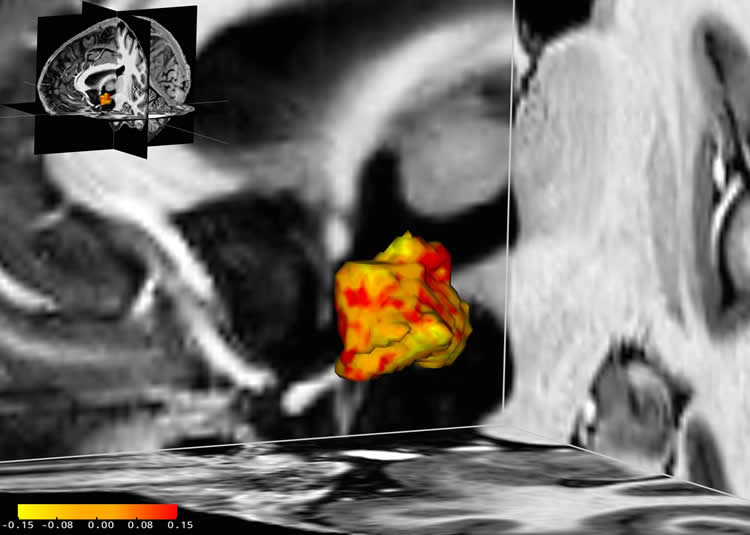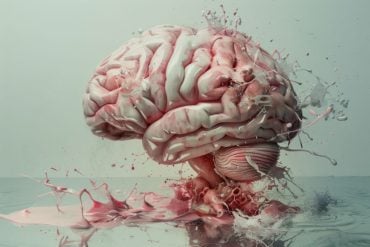Summary: Researchers report the hypothalamus is, on average, five percent larger in those with mood disorders like major depressive disorder and bipolar disorder, than it is in those without depression.
Source: Max Planck Institute.
According to the World Health Organization (WHO) 322 million people worldwide were affected by depression in 2015–4.4 percent of the world’s population. In the search for the underlying causes of this widespread disorder, researchers have concluded that it could arise from predisposition combined with an individual’s environmental stress factors.
So far, it is known that people more predisposed to depression show a dysregulation of the endogenous stress response system, otherwise known as the hypothalamic-pituitary-adrenal axis (HPA axis), which is normally triggered when we are faced with a stressful situation. This response increases the amount of cortisol, providing the body with more energy when faced with a potential threat or challenge. Once the challenging situation has passed, several control mechanisms in the HPA axis normally ensure the system returns to a balanced state.
In people who suffer with depressive disorder or who are more predisposed, this is not the case. Instead, a malfunction of the feedback mechanism results in a stress response operating at full throttle, even when there is no apparent stressful situation. Until now, the underlying reason for this hyperactive stress response system and the role of the hypothalamus as its overall control unit has remained unclear.

In a recent study with 84 participants, scientists at the Max Planck Institute for Human Cognitive and Brain Sciences (MPI CBS) in Leipzig and the Department of Psychiatry and Psychotherapy of the University Clinic in Leipzig have revealed that in people with an affective disorder, the left hypothalamus was on average five per cent larger than that of their healthy counterparts. ‘We observed that this brain region is enlarged in people with depression as well as in those with bipolar disorder, two types of affective disorders’, says Stephanie Schindler, a PhD student at both research institutes involved in the study and first author of the underlying publication just published in the scientific journal Acta Psychiatrica Scandinavica. Furthermore, in one of the groups of participants with depression it was also revealed that the more severe the depression, the larger the hypothalamus was. Medication did not have any effect on the size of the hypothalamus.
These relations were found out using a high-resolution 7-Tesla MRI scanner. The severity of disorders was measured using standardised questionnaires and interviews.
Although studies have shown this brain structure to be more active in people with depression or bipolar disorder, it is not yet known what role a larger hypothalamus plays. ‘Higher activity could lead to structural changes and thus to a larger volume of the hypothalamus normally the size of a one cent coin’, says Stefan Geyer, one of the study’s principal investigators and head of the research group Anatomical Analysis of the Organization of the Human and Non-Human Primate Brain at MPI CBS.
Source: Verena Müller – Max Planck Institute
Publisher: Organized by NeuroscienceNews.com.
Image Source: NeuroscienceNews.com image is credited to Acta Psychiatrica Scandinavica.
Original Research: Open access research for “Hypothalamus enlargement in mood disorders” by S. Schindler, L. Schmidt, M. Stroske, M. Storch, A. Anwander, R. Trampel, M. Strauß, U. Hegerl, S. Geyer, and P. Schönknecht in Acta Psychiatrica Scandinavica. Published September 19 2018.
doi:10.1111/acps.12958
[cbtabs][cbtab title=”MLA”]Max Planck Institute”Brain Region for Stress Control is Larger in Depressed People.” NeuroscienceNews. NeuroscienceNews, 24 September 2018.
<https://neurosciencenews.com/stress-control-hpa-axis-depression-9905/>.[/cbtab][cbtab title=”APA”]Max Planck Institute(2018, September 24). Brain Region for Stress Control is Larger in Depressed People. NeuroscienceNews. Retrieved September 24, 2018 from https://neurosciencenews.com/stress-control-hpa-axis-depression-9905/[/cbtab][cbtab title=”Chicago”]Max Planck Institute”Brain Region for Stress Control is Larger in Depressed People.” https://neurosciencenews.com/stress-control-hpa-axis-depression-9905/ (accessed September 24, 2018).[/cbtab][/cbtabs]
Abstract
Hypothalamus enlargement in mood disorders
Objective
The purpose of this study was to determine, in vivo, whether the hypothalamus volume is reduced in patients with mood disorders.
Methods
The cross‐sectional study included 20 unmedicated (MDDu) and 20 medicated patients with major depressive disorder, 21 patients with bipolar disorder, and 23 controls. Twenty of the controls were matched to the MDDu. Seven Tesla, T1‐weighted magnetic resonance images were acquired and processed using methods specifically developed for high‐precision volumetry of the hypothalamus.
Results
An overall group difference was observed for the left hypothalamus volume corrected for intracranial volume. Planned contrasts identified that the left hypothalamus was approximately 5% larger in each patient group compared with the control group. A paired t‐test with the 20 matched pairs of MDDu and controls and without correction for covariates confirmed the larger left hypothalamus volume in MDDu.
Conclusions
Contrary to our expectations, the hypothalamus volume was increased in patients with uni‐ and bipolar affective disorders. The effect was left‐sided and independent of medication status or statistical correction for covariates. Supported by emerging evidence that the stress response may be related to structural and functional asymmetry in the brain, our finding suggests a crucial role of the hypothalamus in mood disorders.






